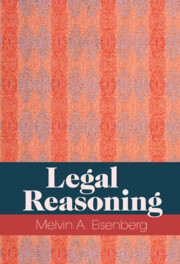Book contents
- Legal Reasoning
- Legal Reasoning
- Copyright page
- Dedication
- Contents
- Preface
- 1 A Brief Introduction to the Common Law
- 2 Rule-Based Legal Reasoning
- 3 Reasoning from Precedent and the Principle of Stare Decisis
- 4 How It Is Determined What Rule a Precedent Establishes
- 5 Reasoning from Authoritative Although Not Legally Binding Rules
- 6 The Role of Moral, Policy, and Empirical Propositions in Legal Reasoning, and the Judicial Adoption of New Legal Rules Based on Social Propositions
- 7 Legal Rules, Principles, and Standards
- 8 The Malleability of Common Law Rules
- 9 Hiving Off New Legal Rules from Established Legal Rules, Creating Exceptions to Established Rules, and Distinguishing
- 10 Analogy-Based Legal Reasoning
- 11 The Roles of Logic, Deduction, and Good Judgment in Legal Reasoning
- 12 Reasoning from Hypotheticals
- 13 Overruling
- Acknowledgments
- Index
11 - The Roles of Logic, Deduction, and Good Judgment in Legal Reasoning
Published online by Cambridge University Press: 22 September 2022
- Legal Reasoning
- Legal Reasoning
- Copyright page
- Dedication
- Contents
- Preface
- 1 A Brief Introduction to the Common Law
- 2 Rule-Based Legal Reasoning
- 3 Reasoning from Precedent and the Principle of Stare Decisis
- 4 How It Is Determined What Rule a Precedent Establishes
- 5 Reasoning from Authoritative Although Not Legally Binding Rules
- 6 The Role of Moral, Policy, and Empirical Propositions in Legal Reasoning, and the Judicial Adoption of New Legal Rules Based on Social Propositions
- 7 Legal Rules, Principles, and Standards
- 8 The Malleability of Common Law Rules
- 9 Hiving Off New Legal Rules from Established Legal Rules, Creating Exceptions to Established Rules, and Distinguishing
- 10 Analogy-Based Legal Reasoning
- 11 The Roles of Logic, Deduction, and Good Judgment in Legal Reasoning
- 12 Reasoning from Hypotheticals
- 13 Overruling
- Acknowledgments
- Index
Summary
There are many schools of formal logic, but in law the term logic is used informally to mean sound reasoning. So when we say that a judicial opinion is logical we mean that is internally consistent and makes sense. Deduction is major expression of logical thinking. Formal deduction takes the form of a syllogism consisting of a general statement, known as the major premise, a specific statement, known as the minor premise, and a conclusion that necessarily follows from the premises. All or most common law cases involve implicit informal deductive reasoning, as in “If an offeree rejects an offer her power of acceptance is terminated. The offeree rejected the offer. Therefore her power of acceptance was terminated.” However, few common law cases involve explicit formal syllogistic reasoning. Judgment is pervasive in legal reasoning, but the role of good judgment is frequently overlooked, partly because it cannot be taught and is difficult to acquire. It is a quality, like grace, that some have and some don’t. It differs from intelligence. A judge can be very intelligent but lack good judgment. Great judges have the quality of great judgment.
- Type
- Chapter
- Information
- Legal Reasoning , pp. 86 - 89Publisher: Cambridge University PressPrint publication year: 2022

